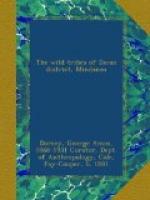[1] Large copper gong.
[2] Much more is often given. One girl in Cibolan brought six horses, five agongs, and several spears and knives.
[3] See p. 107. [Transcriber’s note: 5 pages after this.]
A man may have as many wives as he desires and can afford, but he may not take a second mate until a child has been born to the first union, or the wife has been proved beyond doubt to be barren. The groom renders no services to the father of the second wife, but instead of this pays a double price for the girl, for he not only pays her parents but is forced also to give a like sum to his first wife, who, in turn, presents it to her father. Should a third wife be added to the family a sum equal to her cost is divided among the earlier wives. The first wife is generally the lady of the house and does not particularly object to having other girls added to the family, provided they are willing to obey her. Datu Tongkaling has had four wives, three of whom are still living.
If a couple cannot agree, a separation can be arranged by applying to the local head-man, who, after listening to their troubles, decides which one is at fault, and whether or no the marriage gifts must be returned. When a couple parts, plates, bowls, and jars are sometimes broken as a sign that they will never live together again and the spirits are thus called to witness. A divorced woman may remarry, but unless the sum originally paid for her has been returned, the new groom must pay such an amount to the first husband.
SICKNESS AND DEATH.




